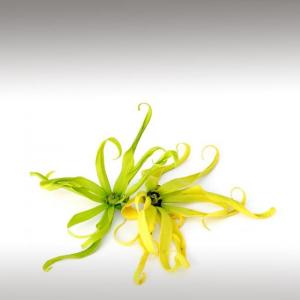
YLANG-YLANG ESSENTIAL OIL (CANANGA ODORATA) - ESSENTIAL OILS

BASE / GENERAL DATA
Information submited: May 1, 2014 Modified: March 12, 2018 By: OperaDreamhouse
Botanical Name: Cananga Odorata
Botanical Origin: Philippines
Common Method of Extraction: Steam distilled.
Distillation Type: Complete (after 15 hours), Extra (after 15 hours), I (after 4 hours), , II (after 7hours) , III (after 10 hours) ;
Part Typically Used: Fresh flowers
Color: Clear with a yellow tinge
Consistency: Liquid, clear
Perfumery Note: Middle/base
Shelf Life: 2-3 years
Strength of Initial Aroma: Floral, heady, exotic, intensely sweet, fresh, slightly fruity, fragrant yet delicate.
Blends Well With: Clary sage, geranium, lavender, lemon, bergamot, rose, orange, patchouli, grapefruits, rosewood, sandalwood, tuberose, vetiver, peru balsam, petitgrain, frankincense, jasmine essential oils.
Common name: Ylang-Ylang is sometimes called the other tree - Anona Odorantissima (Cananga), but there are suggestions that it is one and the same plant, which varies depending on growing conditions and soil type. Both Ylang-Ylang and Cananga are members of the Annonaceae plant family; they also both belong to the same genus - Cananga. Even their species is confusing; both are Odorata species. The small distinguishing feature that separates these two very similar plants is in the addition of the words var. genuina to Ylang-Ylang’s botanical name and the addition of var. Macrophylla to Cananga’s botanical name. This is simply a “lower” rank than that of a species in the botanical ranking system, and it helps to separate out the subtle differences between each plant. In fact, the two plants are so similar, and produce such similar essential oils, that you will notice some suppliers (mistakenly) selling Cananga essential oil as Ylang-Ylang essential oil.
Ylang-ylang essential oil is a more floral oil than Cananga essential oil. Therefore, those that find the heady aroma of Ylang-Ylang essential oil too much may prefer the aroma of Cananga essential oil. Note that the chemical components of each oil also vary.
Chemical structure: The chief components of the essential oil of Ylang-Ylang are benzyl acetate, benzyl benzoate linalool, caryophyllene, geranyl acetate, methyl benzoate, p-cresyl methyl ether and other components known as sesquiterpenes, which all contribute to its aroma and medicinal properties.
Note: Depending on your condition and what you want to use it for, it can double as both a relaxant and a stimulant.
Ylang-Ylang comes from a Tagalog word “Ilang” meaning “Wilderness” or the word “Ilang-Ilan” meaning “Rare”.
The trees (Cananga Odorata) from which the essential oil is distilled - known as perfume trees - originated in the Philippines and have now spread throughout tropical Asia. They were introduced to the island of Reunion in 1884, then to Madagascar, nearby Mayotte and Tahiti: they can be found in the wild in Malaysia, India and Indochina.
The trees are generally small, but can reach a height of about 30 m (100 ft). The bark is smooth, with shallow cracks, and the branches "weep" like willow. The leaves are large, oval and shiny, as much as 20 cm (8 in) long, with a slightly hairy underside. The flowers form in axillary clusters, greenish to start with, then, about 20 days later, they become yellow and very highly perfumed. These flowers appear constantly, but are more abundant in the rainy season. A many-seeded, greenish fruit succeeds the flowers.
Many varieties of the tree are cultivated for their essential oil, the ones bearing the smallest flowers producing the most subtle perfume. Strangely, the flowers of the wild trees have little perfume. A young tree of about 5 years old yields about 5 kg flowers: when it reaches the age of 10 years, it can give as much as 10-15 kg.
Primary distillation stage (about an hour) are of the highest quality, known as Ylang-Ylang Extra, has super floral flavor, special complex chemical composition, and used in perfumery. Subsequent parts of distillate are much poorer, lighter and less floral - I st Fraction (after 4 hours), II nd Group (after 7hours) III rd Group (after 10 hours) And Complete - Full distillate is 15 hours. The best oil is obtained from the early summer and early in the morning collected flower rings:
The quality of Ylang-Ylang oil depends a lot on the cultivation of the flowers that are used - specifically the time of day that the flowers were picked. It’s believed that flowers picked early in the morning yield the most beneficial oil, since the flowers are pollinated by night moths. The drop in temperature and dewiness that can occur overnight might also have positive effects on the oil’s chemical structure. The most intensive smell is released from dusk until dawn so when sunrise comes, the flowers natural aroma fills the air.
The 15-hour-long distillation process used to Extract Ylang-Ylang oil also impacts its potency and abilities. Steam distillation is the preferred method since this preserves the oil’s volatile compounds best. And during the long distillation process, the proportion of oil that is extracted first is believed to be the highest quality of the whole batch - often called “Ylang-Ylang Complete” or “Ylang-Ylang Extra”.
The oil is very liquid, clear and has an extraordinary fragrance, with high notes of Hyacinth and Narcissus.
According to a 2014 report published in the Journal of Experimental Botany, the floral scents of Ylang-Ylang are a key factor in plant-insect interactions and are vital for successful pollination since they repel pests and bugs.
Botanical Origin: Philippines
Common Method of Extraction: Steam distilled.
Distillation Type: Complete (after 15 hours), Extra (after 15 hours), I (after 4 hours), , II (after 7hours) , III (after 10 hours) ;
Part Typically Used: Fresh flowers
Color: Clear with a yellow tinge
Consistency: Liquid, clear
Perfumery Note: Middle/base
Shelf Life: 2-3 years
Strength of Initial Aroma: Floral, heady, exotic, intensely sweet, fresh, slightly fruity, fragrant yet delicate.
Blends Well With: Clary sage, geranium, lavender, lemon, bergamot, rose, orange, patchouli, grapefruits, rosewood, sandalwood, tuberose, vetiver, peru balsam, petitgrain, frankincense, jasmine essential oils.
Common name: Ylang-Ylang is sometimes called the other tree - Anona Odorantissima (Cananga), but there are suggestions that it is one and the same plant, which varies depending on growing conditions and soil type. Both Ylang-Ylang and Cananga are members of the Annonaceae plant family; they also both belong to the same genus - Cananga. Even their species is confusing; both are Odorata species. The small distinguishing feature that separates these two very similar plants is in the addition of the words var. genuina to Ylang-Ylang’s botanical name and the addition of var. Macrophylla to Cananga’s botanical name. This is simply a “lower” rank than that of a species in the botanical ranking system, and it helps to separate out the subtle differences between each plant. In fact, the two plants are so similar, and produce such similar essential oils, that you will notice some suppliers (mistakenly) selling Cananga essential oil as Ylang-Ylang essential oil.
Ylang-ylang essential oil is a more floral oil than Cananga essential oil. Therefore, those that find the heady aroma of Ylang-Ylang essential oil too much may prefer the aroma of Cananga essential oil. Note that the chemical components of each oil also vary.
Chemical structure: The chief components of the essential oil of Ylang-Ylang are benzyl acetate, benzyl benzoate linalool, caryophyllene, geranyl acetate, methyl benzoate, p-cresyl methyl ether and other components known as sesquiterpenes, which all contribute to its aroma and medicinal properties.
Note: Depending on your condition and what you want to use it for, it can double as both a relaxant and a stimulant.
Ylang-Ylang comes from a Tagalog word “Ilang” meaning “Wilderness” or the word “Ilang-Ilan” meaning “Rare”.
The trees (Cananga Odorata) from which the essential oil is distilled - known as perfume trees - originated in the Philippines and have now spread throughout tropical Asia. They were introduced to the island of Reunion in 1884, then to Madagascar, nearby Mayotte and Tahiti: they can be found in the wild in Malaysia, India and Indochina.
The trees are generally small, but can reach a height of about 30 m (100 ft). The bark is smooth, with shallow cracks, and the branches "weep" like willow. The leaves are large, oval and shiny, as much as 20 cm (8 in) long, with a slightly hairy underside. The flowers form in axillary clusters, greenish to start with, then, about 20 days later, they become yellow and very highly perfumed. These flowers appear constantly, but are more abundant in the rainy season. A many-seeded, greenish fruit succeeds the flowers.
Many varieties of the tree are cultivated for their essential oil, the ones bearing the smallest flowers producing the most subtle perfume. Strangely, the flowers of the wild trees have little perfume. A young tree of about 5 years old yields about 5 kg flowers: when it reaches the age of 10 years, it can give as much as 10-15 kg.
Primary distillation stage (about an hour) are of the highest quality, known as Ylang-Ylang Extra, has super floral flavor, special complex chemical composition, and used in perfumery. Subsequent parts of distillate are much poorer, lighter and less floral - I st Fraction (after 4 hours), II nd Group (after 7hours) III rd Group (after 10 hours) And Complete - Full distillate is 15 hours. The best oil is obtained from the early summer and early in the morning collected flower rings:
The quality of Ylang-Ylang oil depends a lot on the cultivation of the flowers that are used - specifically the time of day that the flowers were picked. It’s believed that flowers picked early in the morning yield the most beneficial oil, since the flowers are pollinated by night moths. The drop in temperature and dewiness that can occur overnight might also have positive effects on the oil’s chemical structure. The most intensive smell is released from dusk until dawn so when sunrise comes, the flowers natural aroma fills the air.
The 15-hour-long distillation process used to Extract Ylang-Ylang oil also impacts its potency and abilities. Steam distillation is the preferred method since this preserves the oil’s volatile compounds best. And during the long distillation process, the proportion of oil that is extracted first is believed to be the highest quality of the whole batch - often called “Ylang-Ylang Complete” or “Ylang-Ylang Extra”.
The oil is very liquid, clear and has an extraordinary fragrance, with high notes of Hyacinth and Narcissus.
According to a 2014 report published in the Journal of Experimental Botany, the floral scents of Ylang-Ylang are a key factor in plant-insect interactions and are vital for successful pollination since they repel pests and bugs.

SPIRITUAL PRACTISES DATA
Information submited: May 1, 2014 Modified: March 12, 2018 By: OperaDreamhouse
Ylang-ylang oil is said to work with the cardiovascular, endocrine and hormonal system as well as supporting emotional and spiritual balance. Many of these properties and the potential uses for Ylang-Ylang are those that closely link the body to the emotions or the mind, showing very clearly the mind-body connection and how nature can help our body find balance as a whole.
Ylang-Ylang essential oil is a health booster for the nervous system. It strengthens the nervous system and repairs any damage it may have suffered. Furthermore, it also reduces stress on the nerves and protects them from developing a number of nervous disorders.
In Chinese medicine, Ylang-Ylang is seen as energetically cool and moist, making it a Yin oil. It is associated with the Earth and Fire Elements.
Ylang-Ylang essential oil is said to help balance the Sacral and Solar Plexus Chakras.
Ylang-Ylang is an excellent Yang pacifying essential oil for Solar Plexus imbalances. It's cooling and clearing. It clears anger, frustration and other emotionally charged or agitated states. Ylang-Ylang makes one feel lovable, joyful and peaceful. Consequently, it promotes enthusiasm and confidence.
Ylang-Ylang essential oil is a health booster for the nervous system. It strengthens the nervous system and repairs any damage it may have suffered. Furthermore, it also reduces stress on the nerves and protects them from developing a number of nervous disorders.
In Chinese medicine, Ylang-Ylang is seen as energetically cool and moist, making it a Yin oil. It is associated with the Earth and Fire Elements.
Ylang-Ylang essential oil is said to help balance the Sacral and Solar Plexus Chakras.
Ylang-Ylang is an excellent Yang pacifying essential oil for Solar Plexus imbalances. It's cooling and clearing. It clears anger, frustration and other emotionally charged or agitated states. Ylang-Ylang makes one feel lovable, joyful and peaceful. Consequently, it promotes enthusiasm and confidence.

MEDICINE / HEALTH DATA
Information submited: May 1, 2014 Modified: March 12, 2018 By: OperaDreamhouse
Therapeutic Properties :
Antidepressant
Antiseborrhoeic
Antiseptic
Aphrodisiac
Hypotensive
Nervine
Sedative
Fields of application: Increases libido, aphrodisiac and social enhancerfights, depression, induces relaxed feeling, strengthens nervous system, cures seborrhoea, lowers blood pressure, prevents septic infections, cures infections in internal organs, fighting parasites, regulating heartbeat, healing cardiac problems, promoting healthy intestinal function, preservering skin health, reducing PMS symptoms, natural hair care product, diabetes fighter, classified as a pulmonary and urinary system antiseptic,helps to deal with nervous tic.
Contraindications: It is classed as a non-toxic, non-irritant and non-sensitizing oil. Some cases of sensitivity, nausea and headache have been observed when taken in excessive amounts. Otherwise, when taken in recommended doses, it is non-toxic and is not reported to cause any irritation.
Use Ylang-Ylang sparingly whether internally or topically. High levels might cause reactions and sensitives, so be sure to do a skin patch check first before using on your face, skin or ingesting. You also want to use caution when dealing with low blood pressure. If you take blood pressure medications or have an existing heart condition, talk to your doctor before beginning treatment.
Pregnancy / Lactation : It should be avoided by pregnant women as it is a uterine stimulant and could cause miscarriages. Ylang-ylang oil seems safe for children, women who are breastfeeding women in small amounts when a high-quality oil is used.
Children: Uder 2 years.
Guidelines: Diluted : for topical use : recommend dermal maximum of 0.8%
Ylang-Ylang is exotic, intense and exciting. it’s believed that its healing properties can help in cases of impotence and frigidity. It can help dispel feelings of anger, jealousy and envy. With its sensual and soothing aroma, helps restore self-confidence and allows you to express and appreciate your inner beauty. Ylang-Ylang flowers are strewn on the beds of newly married South-Asian couples on their wedding night.
The essential oil derived from Ylang-Ylang can really activate the romance within couples and can improve sexual life. This can be very beneficial for those people who have lost interest in sex due to tremendous work load, professional stress, depression, or the effects of pollution. The loss of libido or frigidity is a growing problem in modern life, but relying on natural essential oils like Ylang-Ylang can really help to find your sex drive.
Ylang-Ylang essential oil is a health booster for the nervous system. It strengthens the nervous system and repairs any damage it may have suffered: Ylang-Ylang essential oil (Cananga Odorata) fights depression and relaxes both the body and soul, thereby driving away anxiety, sadness, and chronic stress. It also has an uplifting effect on mood and induces feelings of joy and hope. It may be an effective treatment for those undergoing nervous breakdowns and acute depression after a shock or an accident.
Studies show that high-quality Ylang-Ylang oil holds a high percentage of active constituents called terpenoids. Isolated terpenoid derivatives (including canangaterpenes IV-VI) show promising results as natural therapeutic agents for the treatment of several skin disorders. When tested on cancerous melanoma skin cells, terpenoid compounds exhibit a potent inhibitory effect on cell melanogenesis and immune-system cytotoxicity. In other words, antioxidants in ylang ylang oil help protect skin cells from oxidative stress and DNA damage that can lead to cancer cell formation.
Researchers from the Phytochemistry Research Department at the University of Rajshahi in Bangladesh found that these phytochemicals also possess antibacterial, antifungal and cytotoxic activities when used topically or internally by humans. They can help improve immune function and lower inflammation, which is a leading contributor to most diseases, such as cancer, heart disease, autoimmune and cognitive-related disorders.
This oil is a very effective agent for lowering blood pressure. In recent times, since high blood pressure is a major health epidemic among both the young and the old, Ylang-Ylang essential oil can be an easy and natural solution. It has no adverse side effects on health, if taken in prescribed quantities.
Studies have also shown that Ylang-Ylang essential oil can inhibit the fungi, Candida albicans, at concentrations of just 1%. That makes it a potent antifungal oil.
Health wise, Ylang-Ylang helps ease the nervous system lessening tension, anxiety and promoting a peaceful, and calming ambiance.
Thanks to its calming and sedative qualities, Ylang-Ylang oil can assist with problems such as high blood pressure, rapid breathing and heartbeat. Helps with anxiety, tension, shock, fear and panic. In fact all nervous conditions.
Its calming properties are great for insomniacs down to a point where they may actually desire sleep.
Antidepressant
Antiseborrhoeic
Antiseptic
Aphrodisiac
Hypotensive
Nervine
Sedative
Fields of application: Increases libido, aphrodisiac and social enhancerfights, depression, induces relaxed feeling, strengthens nervous system, cures seborrhoea, lowers blood pressure, prevents septic infections, cures infections in internal organs, fighting parasites, regulating heartbeat, healing cardiac problems, promoting healthy intestinal function, preservering skin health, reducing PMS symptoms, natural hair care product, diabetes fighter, classified as a pulmonary and urinary system antiseptic,helps to deal with nervous tic.
Contraindications: It is classed as a non-toxic, non-irritant and non-sensitizing oil. Some cases of sensitivity, nausea and headache have been observed when taken in excessive amounts. Otherwise, when taken in recommended doses, it is non-toxic and is not reported to cause any irritation.
Use Ylang-Ylang sparingly whether internally or topically. High levels might cause reactions and sensitives, so be sure to do a skin patch check first before using on your face, skin or ingesting. You also want to use caution when dealing with low blood pressure. If you take blood pressure medications or have an existing heart condition, talk to your doctor before beginning treatment.
Pregnancy / Lactation : It should be avoided by pregnant women as it is a uterine stimulant and could cause miscarriages. Ylang-ylang oil seems safe for children, women who are breastfeeding women in small amounts when a high-quality oil is used.
Children: Uder 2 years.
Guidelines: Diluted : for topical use : recommend dermal maximum of 0.8%
Ylang-Ylang is exotic, intense and exciting. it’s believed that its healing properties can help in cases of impotence and frigidity. It can help dispel feelings of anger, jealousy and envy. With its sensual and soothing aroma, helps restore self-confidence and allows you to express and appreciate your inner beauty. Ylang-Ylang flowers are strewn on the beds of newly married South-Asian couples on their wedding night.
The essential oil derived from Ylang-Ylang can really activate the romance within couples and can improve sexual life. This can be very beneficial for those people who have lost interest in sex due to tremendous work load, professional stress, depression, or the effects of pollution. The loss of libido or frigidity is a growing problem in modern life, but relying on natural essential oils like Ylang-Ylang can really help to find your sex drive.
Ylang-Ylang essential oil is a health booster for the nervous system. It strengthens the nervous system and repairs any damage it may have suffered: Ylang-Ylang essential oil (Cananga Odorata) fights depression and relaxes both the body and soul, thereby driving away anxiety, sadness, and chronic stress. It also has an uplifting effect on mood and induces feelings of joy and hope. It may be an effective treatment for those undergoing nervous breakdowns and acute depression after a shock or an accident.
Studies show that high-quality Ylang-Ylang oil holds a high percentage of active constituents called terpenoids. Isolated terpenoid derivatives (including canangaterpenes IV-VI) show promising results as natural therapeutic agents for the treatment of several skin disorders. When tested on cancerous melanoma skin cells, terpenoid compounds exhibit a potent inhibitory effect on cell melanogenesis and immune-system cytotoxicity. In other words, antioxidants in ylang ylang oil help protect skin cells from oxidative stress and DNA damage that can lead to cancer cell formation.
Researchers from the Phytochemistry Research Department at the University of Rajshahi in Bangladesh found that these phytochemicals also possess antibacterial, antifungal and cytotoxic activities when used topically or internally by humans. They can help improve immune function and lower inflammation, which is a leading contributor to most diseases, such as cancer, heart disease, autoimmune and cognitive-related disorders.
This oil is a very effective agent for lowering blood pressure. In recent times, since high blood pressure is a major health epidemic among both the young and the old, Ylang-Ylang essential oil can be an easy and natural solution. It has no adverse side effects on health, if taken in prescribed quantities.
Studies have also shown that Ylang-Ylang essential oil can inhibit the fungi, Candida albicans, at concentrations of just 1%. That makes it a potent antifungal oil.
Health wise, Ylang-Ylang helps ease the nervous system lessening tension, anxiety and promoting a peaceful, and calming ambiance.
Thanks to its calming and sedative qualities, Ylang-Ylang oil can assist with problems such as high blood pressure, rapid breathing and heartbeat. Helps with anxiety, tension, shock, fear and panic. In fact all nervous conditions.
Its calming properties are great for insomniacs down to a point where they may actually desire sleep.

BEAUTY / COSMETICS DATA
Information submited: May 1, 2014 Modified: March 12, 2018 By: OperaDreamhouse
Topically, Ylang-Ylang essential oil has been praised for helping combat acne and oily skin. It may help with alopecia (hair loss).
Ylang-Ylang can do wonders for your skin’s health and appearance. It can help preserve the youthful look of your face and body and help to rejuvenate areas of the skin that are looking tired and old.
This essential oil has a balancing and stimulating effect on skin. It's a great oil because it can help with over-dry and over-oily skin - it balances the secretion of sebum. It also has a stimulating effect on the scalp, and is often used to help hair growth.
Ylang-Ylang has skin balancing properties and blend into a cream or lotion to help with both over-dry and over-oily skin.
Add a drop of Ylang-Ylang oil to your palms and rub together until you feel a slight warmth building, pause and take a few deep breaths to calm and relax. You can keep a bottle of Ylang-Ylang by your entry hall to inhale as you come home to transform the busy energy of the day into a calm, uplifted state.
Ylang-Ylang oil can be an effective massage oil, when used in combination with a base oil, such as Jojoba or Wheat Germ. Because the oil s so strong, it’s important to dilute it to avoid the risk of irritation. Thanks to its aphrodisiac properties and pleasant aroma, Ylang-Ylang oil is pefect for sensual couples massages.
The initial pressing of Ylang-Ylang is so sweet and fragrant, it’s oten used in high-end perfumes.
This oil may cause skin sensitivity to persons allergic to the compounds in Ylang-Ylang. In addition, such persons have also experienced dark spots and pigmented contact dermatitis.
On the skin, Ylang-Ylang oil has a soothing effect for skin by balancing the secretion of sebum, and has a stimulating effect on the scalp which promotes more luxurious hair growth.
Ylang-Ylang can do wonders for your skin’s health and appearance. It can help preserve the youthful look of your face and body and help to rejuvenate areas of the skin that are looking tired and old.
This essential oil has a balancing and stimulating effect on skin. It's a great oil because it can help with over-dry and over-oily skin - it balances the secretion of sebum. It also has a stimulating effect on the scalp, and is often used to help hair growth.
Ylang-Ylang has skin balancing properties and blend into a cream or lotion to help with both over-dry and over-oily skin.
Add a drop of Ylang-Ylang oil to your palms and rub together until you feel a slight warmth building, pause and take a few deep breaths to calm and relax. You can keep a bottle of Ylang-Ylang by your entry hall to inhale as you come home to transform the busy energy of the day into a calm, uplifted state.
Ylang-Ylang oil can be an effective massage oil, when used in combination with a base oil, such as Jojoba or Wheat Germ. Because the oil s so strong, it’s important to dilute it to avoid the risk of irritation. Thanks to its aphrodisiac properties and pleasant aroma, Ylang-Ylang oil is pefect for sensual couples massages.
The initial pressing of Ylang-Ylang is so sweet and fragrant, it’s oten used in high-end perfumes.
This oil may cause skin sensitivity to persons allergic to the compounds in Ylang-Ylang. In addition, such persons have also experienced dark spots and pigmented contact dermatitis.
On the skin, Ylang-Ylang oil has a soothing effect for skin by balancing the secretion of sebum, and has a stimulating effect on the scalp which promotes more luxurious hair growth.

FOOD / COOKING DATA
COMMENTS
No comments.
Newest mixtures containing Ylang-Ylang Essential Oil (Cananga Odorata):

Softening hand balm
August 19, 2015

Exotic - smelling body scrub
July 11, 2015


